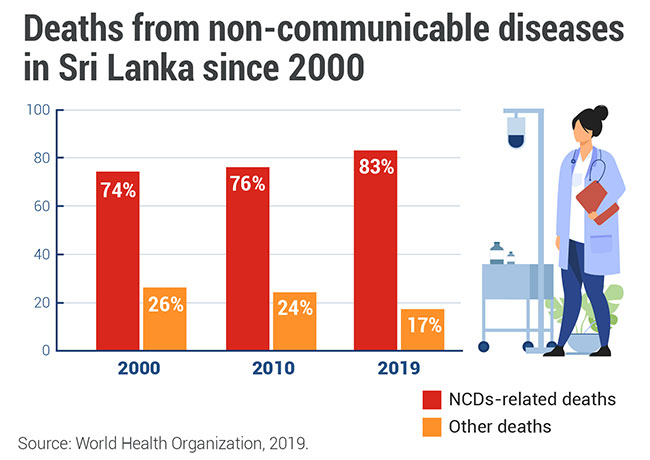Business
The Political Economy of Fiscal Policies and Regulations to Promote Healthy Diets in Sri Lanka

Better Policies for Better Diets:
IPS Policy Insights
Non-communicable diseases (NCDs) have posed a critical health challenge for Sri Lanka for several decades. Estimated to account for 83 per cent of all deaths in Sri Lanka today, NCDs have serious health and economic consequences for both individuals and the country.1 In 2000 and 2010, the deaths that occurred due to NCDs were estimated as 74 and 76 per cent of the total deaths respectively.2 Unhealthy dietary patterns are one of the main behavioural causes for escalating NCD incidences.3 While 72.5 per cent of the Sri Lankan population eat less than five servings of fruit and/or vegetables on average per day4 only 26.9 per cent of the males and 28.0 per cent of the females consume five or more servings of fruits and/or vegetables per day.5 Further, 26.5 per cent of school children aged 13-17 years reported that they consumed a carbonated soft drink at least once per day.6 This shows how unhealthy dietary patterns are followed in Sri Lanka every day.
Political Economy and NCDs
Fiscal interventions are crucial to correct market failures, create incentives to reduce dietary risk factors for NCDs, and generate government revenue.7 Fiscal policies and regulations are implemented within complex country-specific systems. They are influenced by several contextual factors such as social norms and acceptances, stakeholders, their interests and influences, resource implications, equity and human rights, and feasibility. These factors are collectively recognised as the political economy. A country’s political economy greatly influences policy development, implementation, and realisation. A proper understanding of the political economy can help formulate better policies to meet the NCD challenge and create a healthy food environment.
Sri Lanka has introduced various measures including fiscal policies and regulations to promote healthy dietary patterns. The main objective of this policy brief is to highlight how the political economy of the food environment in the country influences the development of policies on healthy diets. The following findings are based on a political economy analysis conducted by the Institute of Policy Studies of Sri Lanka (IPS) as a part of the study on ‘Fiscal Policies and Regulations to Promote Healthy Diets in Sri Lanka’. The study examines the following aspects:
Policy framing – recognition of the main policy issue (underlying assumptions, perceptions, and concepts);
Policy contents – recognition of key policy elements; and Policy development – actors, stakeholders, and their interests.
The findings and recommendations are based on a review of policies introduced from the year 2000 onwards.
Key Findings
Policy Framing
Commendably NCDs, nutrition, and the food environment are recognised as important policy issues and framed well in the policy documents prepared by the health sector, mainly by the Ministry of Health.
Policy Contents
Healthy food consumption, production of healthy foods, social marketing and health promotion campaigns, nutrition labelling, nutrition education and retail sales of healthy food are the areas covered relatively well in the policy documents reviewed. However, many of the policy documents do not devote adequate attention to some crucial aspects such as funding sources, governance, gender sensitivity, and stakeholder identification. For example, the National Health Strategic Master Plan 2016-2025 Preventive Services Programme – Food Safety states, “The government of Sri Lanka will take over the responsibility in terms of finances and resource allocation to improve the food safety” as an assumption.8 But it does not either explain or present the financial sources and mechanisms to be used for this purpose. Likewise, in most policy documents, there is no explicit commitment to adopt fiscal measures to achieve the targets specified in those respective policies.
Policy Development
The Ministry of Health plays a central role in developing policies to reduce NCDs, promote healthy diets, and establish a safer food environment in Sri Lanka. Apart from the Ministry of Health, the Ministry of Agriculture has also demonstrated its interest in nutrition and the food environment. Production of healthy foods, marketing and trading, and nutrition education are some of the key areas covered in the policy documents of the agriculture sector. Other than these two ministries, other public sectors have not indicated any noticeable interest in NCDs, nutrition or the food environment.
Additionally, international development partners such as the World Health Organization (WHO), United Nations Children Fund (UNICEF), United Nations Population Fund (UNFPA), World Food Programme (WFP), and the World Bank (WB) are important stakeholders playing a supportive role in upgrading the nutrition status and food environment and addressing NCDs-related issues.
Recommendations
Continue to focus on policy framing and cover crucial policy elements:
The recognition and attention given to NCDs, nutrition and the food environment are progressive steps that need continuation. This is particularly important given the current NCD burden in Sri Lanka and the increasing trend of NCD-related morbidities and mortalities. However, the review of the policy documents revealed the lack of comprehensive coverage of important policy elements where some of the crucial aspects like governance structures, funding sources, and gender sensitivity are not adequately addressed.
It is essential to comprehensively confer due recognition to all the crucial aspects to implement the policies effectively and to achieve desired outcomes. For example, identifying governance structures is important for the effective implementation of policies. It also indicates the country’s commitment and responsiveness in addressing the issues identified in the policies. Likewise, it is necessary to identify funding sources to implement the proposed actions. No matter how well developed a policy is, it will not achieve its intended impact if the resources to implement the policy are not available.
Proactively seek the active
participation of all stakeholders
in policy development:
The efforts of the health sector (i.e., Ministry of Health) to develop policies on NCDs, nutrition and the food environment are commendable. Yet, the lack of involvement and interest by other sectors is a huge deterrent to achieving the expected outcomes of policies aimed at promoting healthy diets in Sri Lanka. Currently, these issues are regarded as “health issues” and other sectors/ministries either do not adequately recognise or completely ignore these concerns when they formulate policies for their respective sectors. The food environment, nutrition and NCDs are complex and interconnected issues.
Thus, policies that intend to address these issues must take a more holistic approach actively involving all the parties concerned. Further, the involvement of the highest level of the government such as the National Nutrition Council chaired by the President is recommended to lead and coordinate these processes, thereby assuring the highest level of political will and commitment.
This policy insight was prepared by IPS researcher Sunimalee Madurawala (sunimalee@ips.lk) based on findings from a study on ‘Fiscal Policies and Regulations to Promote Healthy Diets in Sri Lanka’ funded by the International Development Research Centre (IDRC), Canada. For more policy insights from IPS, visit: https://www.ips.lk/publications/policy-insights/.
Business
War in Middle East sends shockwaves through Sri Lanka’s export sector

Sri Lanka’s export sector is bracing for fresh turbulence as the escalating conflict involving Iran and parts of the Middle East begins to send shockwaves through global trade, shipping and energy markets.
Though geographically distant from the conflict zone, Sri Lanka’s exporters are far from insulated. Industry leaders warn that higher freight costs, rising oil prices and increased trade risks could erode margins and disrupt key markets if hostilities intensify.
President of the National Chamber of Exporters of Sri Lanka, Indhra Kaushal Rajapaksa told The Island Financial Review that the situation is being closely monitored, as the export community is already feeling the early tremors of global instability.
“Sri Lanka may not be directly involved in the conflict, but we are deeply integrated into global supply chains. Any disruption in the Middle East immediately translates into higher costs and operational uncertainty for our exporters,” Rajapaksa said.
A major concern is the vulnerability of critical maritime corridors such as the Strait of Hormuz and the Red Sea, through which a significant share of global trade and oil shipments pass. Shipping lines have begun rerouting vessels and imposing emergency risk surcharges amid mounting security threats, while insurers are reassessing risk exposure in the region.
“Freight costs had only recently begun stabilising after the pandemic-era disruptions. Now, with vessels avoiding high-risk zones and insurers raising premiums, exporters are once again facing unpredictable shipping expenses,” he noted.
For time-sensitive exports such as apparel and perishables, delays could undermine Sri Lanka’s hard-earned reputation for reliability in competitive markets.
Exporters fear that prolonged instability could trigger sustained freight rate hikes similar to those witnessed during previous global disruptions.
The conflict has also driven global oil prices upward on fears of supply disruptions and shipping bottlenecks. Given that the Middle East accounts for a substantial share of global crude oil output, even perceived threats to supply have immediate price implications.
For Sri Lankan exporters, higher oil prices translate directly into increased fuel, electricity and transportation costs. Manufacturing sectors such as apparel, rubber products, plastics and food processing are particularly vulnerable, as energy forms a core input cost across operations.
“Energy is a fundamental cost component in nearly all export industries. When global oil prices rise, the impact cascades through logistics, production and even raw material pricing,” Rajapaksa explained, warning that sustained high energy costs could squeeze already thin margins.
Beyond cost pressures, the Middle East remains a crucial destination for Sri Lankan exports, especially tea and food products. Around 25 percent of Sri Lanka’s tea exports are shipped to Middle Eastern markets, making the region strategically important for the plantation sector.
“The Middle East is not just a transit route; it is a major market. If economic activity slows in those countries, or if banking and payment channels become complicated due to the conflict, our exporters will face direct consequences,” he cautioned.
War conditions also elevate trade finance and insurance risks. Cargo insurance premiums are climbing, and banks may adopt a more cautious stance toward trade credit involving affected regions.
Exporters could face payment delays, tighter financing conditions and higher compliance requirements, raising the overall cost and complexity of doing business.
This comes at a sensitive time for Sri Lanka’s economy, which is navigating recovery. Higher global oil prices would widen the import bill, potentially exerting pressure on the rupee and fuelling domestic inflation. While currency depreciation can sometimes enhance export competitiveness, rising input costs may offset any exchange rate advantage.
Despite the challenges, he pointed to potential opportunities if Sri Lanka responds strategically. As global buyers seek to diversify supply chains away from unstable regions, Sri Lanka could position itself as a reliable sourcing hub for apparel, rubber-based products, processed foods and value-added agricultural goods.
“In every global disruption there are risks, but there are also opportunities. If Sri Lanka strengthens trade facilitation, improves logistics efficiency and ensures policy consistency, we can attract buyers looking for stable alternatives,” he said.
He stressed that resilience and preparedness would be critical in the weeks ahead, as exporters closely watch developments in the Middle East and global energy markets, aware that distant conflicts can swiftly reshape local economic realities.
By Ifham Nizam
Business
Ranil says Iran leadership eviction methodology unacceptable

Ranil Wickremesinghe on Monday criticised the methodology adopted by U.S. President Donald Trump in dealing with Iran, stating that externally driven attempts to dismantle the leadership of another sovereign nation are unacceptable and fraught with dangerous global consequences.
Addressing a group of social media activists at the United National Party (UNP) office on Flower Road, Colombo, Wickremesinghe said that while geopolitical tensions in the Middle East were deepening, the principle of state sovereignty must not be undermined under any circumstances.
Referring to recent escalations between Washington and Tehran and remarks attributed to President Trump concerning Iran’s Supreme Leader Ali Khamenei, Wickremesinghe said:
“President Trump has alleged that Khamenei’s government was responsible for the deaths of hundreds of people in Iran and that action was taken to remove that leadership. However, the methodology used for dismantling the leadership of another administration in such a manner is not acceptable.”
He added that President Trump appeared to be seeking to engage in global affairs “as he likes,” warning that such actions carried far-reaching implications beyond the immediate theatre of conflict.
“What has happened following the Iran strikes is an issue with deep implications,” Wickremesinghe said, noting that the balance of power in sensitive regions must not be disturbed recklessly. Drawing a regional parallel, he observed that control of strategic sea lanes such as the Indian Ocean could not be handed over to a single dominant power.
On the economic fallout, Wickremesinghe sought to allay fears of a severe energy crisis in Sri Lanka. “Amid supply constraints because of Iran, it won’t be a big issue as other oil-producing countries will offer sufficient supplies,” he said. However, he expressed concern over the government’s overall economic management. “I don’t see this ballooning into a significant issue, but my concern is whether the government can manage the economy as it is.”
As he made these comments, the Sri Lankan government has yet to formally articulate its position on the escalating Middle East crisis, and Foreign Minister Vijitha Herath has not publicly clarified the government’s official stance.
Responding to a question on whether he was prepared to assume responsibility for governance again, Wickremesinghe said the present administration must be allowed to discharge its mandate. “Let the government go ahead and address the issues. We shouldn’t let them escape the responsibility they have taken upon themselves,” he said.
Commenting on the 90-day detention of former defence intelligence chief Suresh Saleh in connection with investigations into the 2019 Easter Sunday attacks, Wickremesinghe described the matter as a “closed case.” He pointed out that foreign intelligence agencies, including the Federal Bureau of Investigation (FBI), had already submitted their findings.
“Foreign intelligence bodies such as the FBI have submitted their reports and conclusions. The government’s probe direction is not in line with that. Pursuing the case afresh in this manner is a waste of public money,” he said.
Wickremesinghe’s remarks are particularly noteworthy given the long-standing perception of the UNP as broadly aligned with Western policy positions. During President Trump’s first term, when the U.S. administration threatened to suspend funding to the World Health Organization (WHO) at the height of the COVID-19 pandemic, Wickremesinghe publicly appealed to President Trump to reconsider this move , stating that developing countries such as Sri Lanka would face severe repercussions if global health funding were curtailed.
His latest comments therefore signal a clear defence of diplomatic norms and national sovereignty at a time of rising geopolitical volatility, while underscoring his view that global power rivalries must not override established principles of international conduct.
by Sanath Nanayakkare
Business
Dialog partners with Ratmalana Audiology Centre for World Hearing Day 2026

– Offers free hearing tests throughout March
Dialog Axiata PLC, Sri Lanka’s #1 connectivity provider, marks World Hearing Day 2026 by offering free hearing tests throughout March at the Ratmalana Audiology Centre (RAC), reaffirming its commitment to expanding access to hearing care services across Sri Lanka.
Aligned with the 2026 global theme, “From communities to classrooms: hearing care for all children,” the initiative supports greater awareness of early detection and timely intervention, while making hearing screening services accessible to individuals of all ages. The programme is conducted in partnership with RAC, a collaborative project with the Ceylon School for the Deaf and Blind.
Free hearing tests will be available from 3rd to 31st March between 8:30 AM and 5:00 PM. Screenings are open to the public, including both children and adults, particularly those who may have limited access to hearing healthcare services. Appointments can be scheduled by contacting 011 730 7308 or 077 394 5945.
Over the years, Dialog has invested more than Rs. 70 million in the establishment and ongoing enhancement of RAC, which was set up in 2007 to support students of the Ceylon School for the Deaf and Blind while extending services to the wider community. RAC provides free hearing assessments for individuals referred by Government ENT specialists, alongside speech and language therapy, hearing aid evaluation and fitting, and follow-up rehabilitation services.
-

 Opinion5 days ago
Opinion5 days agoJamming and re-setting the world: What is the role of Donald Trump?
-

 Features5 days ago
Features5 days agoAn innocent bystander or a passive onlooker?
-

 Features2 days ago
Features2 days agoBrilliant Navy officer no more
-

 Features6 days ago
Features6 days agoRatmalana Airport: The Truth, The Whole Truth, And Nothing But The Truth
-

 Opinion2 days ago
Opinion2 days agoSri Lanka – world’s worst facilities for cricket fans
-

 Business6 days ago
Business6 days agoIRCSL transforms Sri Lanka’s insurance industry with first-ever Centralized Insurance Data Repository
-

 Business5 days ago
Business5 days agoAn efficacious strategy to boost exports of Sri Lanka in medium term
-

 Features3 days ago
Features3 days agoOverseas visits to drum up foreign assistance for Sri Lanka













